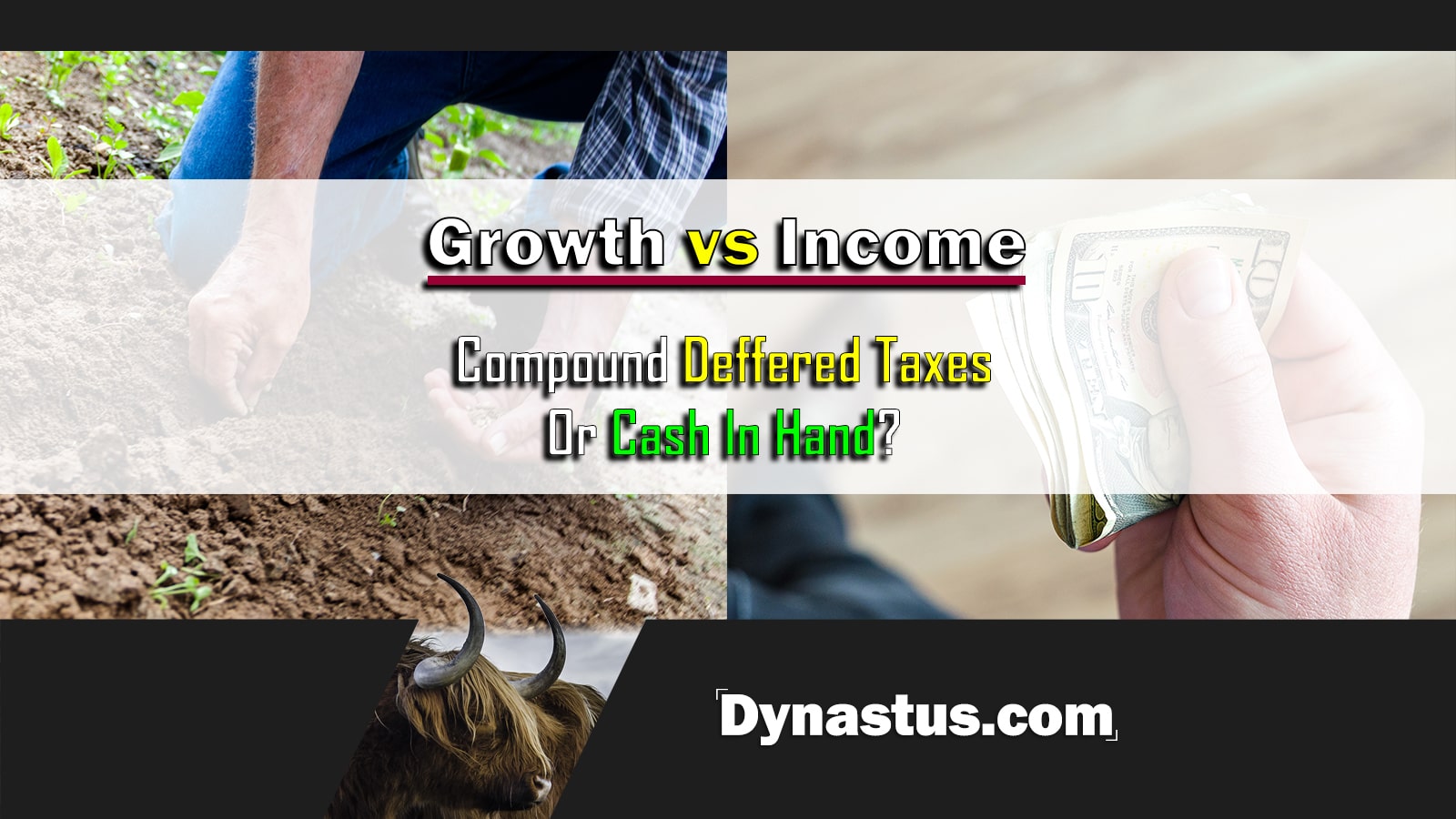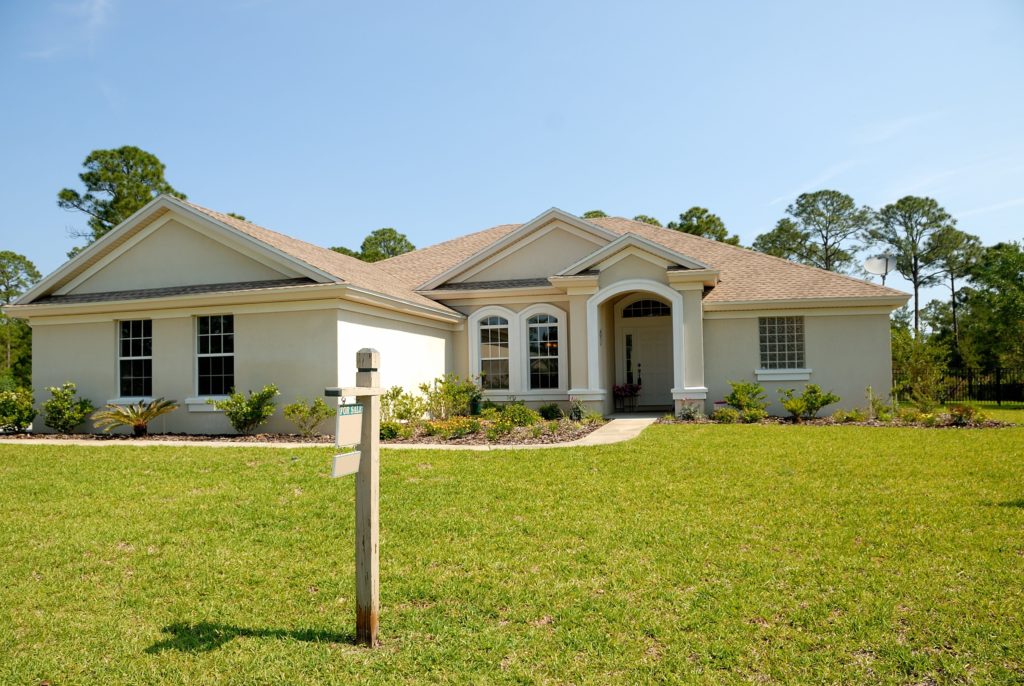
When it comes to building financial capital, one of the great debates is growth vs income investing. A lot of people preach in favor of income-producing assets being the be-all-end-all. Often times they’ll chase rental property or stocks that produce an income through dividends. This is in opposition to growth-centric assets, often labeled as speculative assets. This may be reflected in raw land, growth-centric stocks or business reinvestment.
Not a great deal of people became greatly wealthy by focusing on income alone. Instead they would focus on growing this income, by reinvesting what they make into growth.
Income typically comes first, then a focus is placed on a growth-focused asset base. This usually comes in the form of folding the revenue into itself(like with a business). It an also be applied by making more speculative plays(like putting a high job income into property or developing assets with it).
People will never cease to debate one over the other. But really the answer to the growth vs income question, as it is with most things, is “It Depends.”
There are several factors in deciding which type of asset is best going to suit you and your family. Ultimately though, to build generational wealth for your dynasty, you’re going to need both. The how and when are up to you.
Income
Income is a stream of cash or resources. It can come from any number of sources, but typically it pays to have a few.
When you first venture out to build your Dynasty, you’ll find you and yours have to work hard to create an income and then improve it. This will usually come from a time to money exchange, typically from contracting, freelancing or a job. Jobs are typically the most constant, followed by contracting, then freelancing. The latter two have their own challenges, but I’ll save that for another post.
As you grow in experience, you’ll move towards building or buying assets that produce income. This might come in the form of building an income centric business or similar asset – like writing a book, for example. Or you may move towards purchasing income centric assets, like dividend producing stocks, rental properties or p2p lending(probably don’t lean too much on this).
Income necessary at the beginning of wealth building. Income provides a base on which to build your financial stability, but it will not make you wealthy in and of itself. What it does provide is a stream of steady and somewhat reliable cash that can be used for a multitude of positive things, namely keeping us secure. But it does come at a price.
Income Applications
Bills & Living Costs
Bills are just a part of living, most everybody, save for some hippie-esque communes and bludgers, have them. Instead of tapping into volatile assets that could be at the whim of how the market is feeling, and instead of holding piles of cash subject to inflation, a reliable income stream will take the pressure off when ‘Uncle Bill comes to visit’. Having your bank balance regenerate, with a surplus, gives a peace of mind like no other.
Ideally, you want to be pulling in enough to cover your expenses with a substantial surplus for other emergency expenses. If you’ve managed to build up an emergency fund(which you should) then this surplus income should be plowed right back into your ‘financial field’ to continue to build your wealth. If you’re wholly comfortable with your income, then it’s growth asset time. More on that later.

Ah, an abacus. How quaint.
Sustaining Assets
Income is used to sustain assets that don’t provide an income of their own. An example of this might be a land planted with trees. you won’t realize any cash form such a piece of land for many years. So, in the meantime, you’ll need something to cover your costs. This could(see:shouldn’t) mean you hold a huge pile of cash, which would be subject to the crushing weight of inflation. Instead, what you could do is use income for all the maintenance costs involved with such an asset. Then when that 25 year period is up and you get your big pay off, fold some of the profits back into that asset. The balance could be spread again among income producing and another growth asset.
Even though great wealth in build on the former side of the growth vs income debate, remember that every growth asset is probably going to drain from your income source. You’ll need to strike a balance and add or grow income as you build a growth asset pool.
Happiness
Funnily, Income does buy happiness. Studies show that income does, in fact, have an effect on our happiness levels. But this is only as far as $95,000 for life evaluation(see Maslow’s Hierarchy of Needs) and $60,000-75,000 for emotional satisfaction. Past that, unless you have aspirations for a lavish life(nothing wrong with that, if you work to have the means) you need little more than $95,000(as at 2018).
So if you’re able to achieve that sort of income level in your work perhaps with a bit of a buffer from income producing assets, it’s time to turn your attention elsewhere, to building something greater.
Platform
You’ll have a hard time building wealth without it, but you will not achieve high wealth with income alone, in most cases. This is because income is taxed as you earn it which put a major dent in long-term gains. A little later on, you’ll find an expanded example on how dramatic this effect actually is.
Income Downsides
Tax
Death and Taxes, as the saying goes, are the only two things we can be certain of in life. Unfortunately for income, it is taxed basically as you earn it, this is especially true in a job. Even you’re running an enterprise, you are only able to defer that tax until the end of the year, with the added benefit of deducting expenses. This is great and all, but you’re still basically paying it up front in the grand scheme. The Family Empire building approach is always on the long game and the longer you can defer that tax payment, the better.
So as you earn you pay tax, and lose the opportunity to compound the money you pay in tax, which as you’ll see a little later on, is substantial.
Hedonic Treadmill
Whilst not an inevitability, the edonic treadmill is a very real effect. To surmise, it basically means the more you earn, the more you’re liable to spend. It happens with most everybody. To those who avoid its grasp, it has a secret secondary effect – a willpower debuff. Yes, if you’re earning and not spending it, it does take willpower(like it or not) to resist. This means less available willpower for other things too, like going to the gym or dieting.
You’ll build resistance to this over time of course, but it’s always there, singing it’s sweet alluring tune. Avoiding being subjected to this temptation will help keep your wealth mindset strong.
Income Examples
There are dozens of examples of income-producing assets. To get your imagination started, here are some of the more obvious examples.
Job
This is a bit of an obvious one. With a lot of effort, a job can be built into a substantial stream. Make yourself indispensable to your employer, garner high-income skills and you’ll find yourself flush with cash from this income stream.
Rentals

Rental properties can provide a great stream of revenue to those seeking it. They come with their own set of problems of course, and can also be treated as growth assets as well. With the right purchase, you may even be better off selling a rental later and reinvesting that capital into other things, which is more of a growth approach.
Personally, I and my family have rental properties. I’ve sold some in the past to pay our mortgage down, but will still hold some for some income diversity, and some long-term growth, too.
For property investing, check out:
Income Producing Websites
One other type of asset you could build is an income producing website. These are essentially web assets that receive traffic, then convert that traffic into customers by filling a particular need. This might mean display advertising on a lower level, or affiliate income, where links to other products are provided. It could be an e-commerce website, or a membership site(like a SaaS business). One of my favorite examples is d20pfsrd.com. This is a site that makes it easy to find information for the pen and paper RPG, Pathfinder. Its owner has several sites of a similar nature that make revenue through Patreon and through selling ebooks and other resources to expand upon the game.
I’ve built and bought a few websites in my time, with varied success. If this is of interest to you, then the best way is to start by building a few to try your hand at it, if you can get one or two working for you, you could try purchasing run-down sites and fixing them up. If you’re a higher income individual and lack the time to experiment, you could take the leap and purchase a vetted site form somewhere like Empire Flippers or Quietlight Brokerage. There are plenty of higher tier sites available on these brokerage sites. At first, you’ll probably take a bit of a dip in your income in order to hire out the help and build the sites up, but the long-term income is there.
No matter which way you go, you’ll need great hosting, BlueHost can fill this need if you should go this route. I have an affiliate link here which helps me out a little if you use it.
Dividend Stocks
Dividends are distribution payments form companies made to its shareholders on particular dates. Basically, by holding the company, you get a share of revenues. This doesn’t always mean profits, mind you. Some companies will take a loss and still pay out dividends. Being focused on intergenerational wealth, you shouldn’t put a huge focus on dividends.
Personally, I’m not I wasn’t a huge fan of dividend companies, if I’m being particularly honest. They serve well as income replacement, but the path is long and arduous. From an entrepreneurial perspective, you lose a few of the basic tenets of business. You can’t control the company, the entry is fairly easy, it’s hard to scale them up(due to low payments). You do gain the benefit of time(you don’t have to work in the company to earn this income).
I’m not wholly opposed to dividends, they serve as a good form of diversification and recurring income. The dividend experiment created a video which sums up dividends for generational wealth well. I also recommend the following resources for advice on dividend stocks:
- PassiveDividendIncome
- DivvyDad (Great reading for growth stocks as well)
- DividendDaze
2019 update: I have since built a portfolio of dividend producing stocks. I did this to create a more consistent income stream to allow me to focus on more growth focuses activities like starting new ventures, and potentially buying raw land(to build a family sanctuary) further down the line. These dividend stocks still show signs of growth, but also throw off income – so they strike a balance.
Businesses
A business with enough of a surplus to throw your direction is considered an income producing asset. This is probably my favorite approach, but it’s admittedly damn tough. Of all the options, this is the most flexible. Finding the right fit, maintaining it and growing it will consume you, as any good business should. Making the leap into true business ownership is tough, most people don’t have what it takes, or don’t want it bad enough.
You could even purchase a business, and run it part or full time. The argument can be made for buying vs building a business, but I’ll save that for another post.
Business, even on a smaller scale, like eBay reselling or running your own freelancing enterprise, will provide more earning opportunities. If you’re a tradesperson, then contracting your time will give you greater earning potential and more flexibility in your work too. I’ve done all of these, Freelanced, Sold on Trade Me(our countries eBay), had smaller businesses(like a smoke shop, vending machines and sold worms) and contracted my time out in my trade.
Frugality
Frugality will play a part in building income and savings enough at first. This isn’t really an ‘asset’ in the traditional sense. But more of a metaphysical mentality asset. By saving where you can early on, you’ll be able to compound on the savings later on down the road, eventually snowballing them into growth assets or to roll into building more income.
For more in-depth reading on frugality, I recommend reading through blogs like:
- Duke of Dollars (Great for investing too)
- Method to Your Money
- TheFrugalGirls
Growth
True long-term wealth comes from growth-centric assets. Growth assets are things that have some sort of intrinsic value that may(or may not) increase over time. They require substantial work & research to find and maintain. Very broad in scope, these assets are typically held for decades, rather than months or years. They’re purchased as beta plays, rather than alphas. They are usually fairly illiquid and require specialist knowledge to possess them, improve upon them and time their purchase and sale.
In the case of intergenerational wealth building, these assets may never even be sold. They are able to be redesigned or re-purposed further down the line to provide for future generations. Examples of this are raw land that’s planted into a forest or a commercial yard that you build a warehouse on.
Of course, you’ll need to build a strong wealth culture within your family in order to maintain your long-term assets intergenerationally. Having assets for generations allows the compound effect to work wonders over a long period of time, on both wisde fo the growth vs income paradigm.
Remembers, the saying clogs to clogs is evident in every culture for a reason. Children that don’t know how to build on them or that don’t understand the value of money will all too often sell growth assets for whatever they can and waste the windfall money. This is another reason why growth assets are so important. Income enough so your descendants don’t have to work means they’ll lose grip on the true meaning of wealth and ensure your family money will dissipate.
When building a dynasty, it’s about preparing your descendants for the money, rather than preparing the money for the descendants. This is why Human Capital is the most important resource for your family.
Growth Benefits
Tax-Free (Kinda)
The potential possessed by growth assets is substantial. The ability to grow wealth unabated is great in concept. In fact, as your growth-centric assets appreciate in value, you are not paying tax as you go. This means you’re compounding on the tax you would have paid as well. If you ever do sell, then tax will crop up in the form of a capital gains tax. The difference in what you gain from deferring this tax is absolutely massive. For more folks, its the single best argument in the grwoth vs income debate. As you’ll see in the examples in the next section of this post, the effects are staggering.
Intergenerational Growth

If you can leave the next generation with more than you started with, spiritually, intellectually and financially, you’ve done a good job as a parent.
The wealth building family is immune from the burdens of time. This is because a strong family transcends the span of a single life. Suddenly when your family becomes focused on building an empire, time is no longer a factor as your wealth is able to live on through your descendants. This means that a speculative asset hypothetically never truly needs to be liquidated at any point in an individuals life. Time can be a very generous ‘adversary’ over the long haul. This is why dynasties favor growth vs income a lot of the time.
Recycling
Growth assets can be re-purposed later. The apartment building a grandfather bought can be refurbished into higher-end condos. Family members can stay in the reserved unit on business trips, or a college student suddenly gets a leg up from being able to stay in a building the family owns for a discounted rent.
That raw land your grandmother spent five backbreaking years planting macrocarpa trees on can finally be harvested and sold as premium wood, a good portion of it used to build a high-end complex of townhouses or mc-mansions in a recently gentrified suburb. That raw land is then turned over and resewn into a pasture, where it then houses grass-fed beef as Uncle Jimmy’s business venture.
An old family home can rehouse another generation or become the family sanctuary. Land in the family can have houses built on it a combo of income, and intergenerational living.
The point is that growth assets don’t have to remain that way, they can eventually be repurposed into different or multiple uses that benefit you or your family in a multitude of ways.
Growth Downsides
Illiquidity
Growth assets typically aren’t readily liquidated. That means when push comes to shove and the rent or mortgage payments are due, or you have to pay to maintain a growth asset or another similar expense, you need cash or income enough to produce the cash to cover these overheads.
To get around this, you’ll need to work out a balance of income assets to cover the expenses of a growth asset. For example, if you are holding silver, having a secure location to store the bars will cost you.
Failing this you may be forced into a position to liquidate your growth asset at an inopportune time(or even have it potentially stolen). Continuing the example, you may have to sell your silver at a deflated price due to market pressures just to cover costs. So it really pays to have a good spread to prevent illiquidity from becoming an issue.
Death
The growth vs income debate matters when it comes to death too. The tax man will rob you on all fronts, for no real legitimized reason other than restricting the accumulation of resources by honest, hard working families.
Upon the death of an individual, in most countries, an estate tax is imposed. For those of you who don’t know, an estate tax is a tax on assets that have already been taxed. It’s basically grave-robbing in an attempt to prevent an intergenerational wealth handover for average people.
This prevents power from building in average, hardworking families, creating chinks in the armor of those who built and supported a country. These weaknesses erode to holes that allow socialist parties to enter and demolish a culture, in order to grab the power for themselves.
When an estate tax is imposed, the value of the tax has to be paid in cash to the appropriate governmental department. This is to pay off the debt the government has taken to fund unsustainable policies, or hand over to countries that refuse to support themselves. Grandparents own a million dollar apartment building? The powers that be will need an estate tax of x%(typically 50%), cash up front, or it’s time for an estate sale. They discount the value of the estate to get this cash, despite the fact they determined it’s value to be higher.
‘Till Death Parts You
Too many growth assets that aren’t protected properly will mean they need to be sold in order to cover this estate tax, and it might not be hte best time. Income assets will allow you to have something in the interim to cover this morbid expense.
‘They'(governmental parties) erode your potential to garner wealth for the sake of just collecting tax on something that really needn’t be taxed, logically. This is why estate tax has to be mitigated at all costs. With the proper legal structures, you can actually get estate tax to nil, I believe. You’ll want to consult with a legal professional specializing in this area, however.
There are also 3 D’s your family should avoid if you don’t want death to be a factor in stripping wealth. And no, death isn’t one of the 3D’s.
Divorce
Divorce can get nasty. Former partners can be horrible when it comes to the division of assets. Courts can see these liquidated to acquire cash, which is easier to split. This typically results in them being sold at a steep discount too. So not only are you being forced to sell at a time that is probably not the best, it’s also being sold for less than it’s worth at the time, rapidly eroding wealth.
Divorce is bad for both sides of the growth vs income debate. Growth takes a hit from and alimony(payments for the woman having her lifestyle ‘impacted’) affects income of the male marriage.
The court system in the west favors the woman always as well. So if you are in a relationship where the patriarch has built all teh wealth, and then the woman decides to end it, teh patriarch can kiss is family goodbye all while paying alimony and losing half his wealth. When it comes to life, for men, its always sink or swim, but women will be kept afloat.
[bctt tweet=”For men, its sink or swim. But women will always be kept afloat.” username=”Dynastus”]
Growth Examples
The definition of a growth asset is way too broad to ever make a definitive list. There are varying opinions on how to determine whats worth holding onto as well, so for you and your family, it will be a joint decision on what kind of family assets you decide to include as growth.
Growth Stocks

This is 100% what stock investing looks like at any given time.
As far as growth assets go, stocks are probably the most accessible. Buy purchasing into companies that are more interested in growing their business than producing income, you can benefit from the growth they create. Amazon is a prime example, showing a growth of approximately 2300% in the last ten years(as of August 2018).
Raw Land
Raw land is a prime example of a growth based asset. A lot of the time, raw land produces little to no income. You may be able to set it up as a small farm or lease it out for a tiny amount. More often than not, this will not be producing any substantial income for you, and may even cost you to hold onto. But if you buy right and wait long enough, land can climb in value substantially over time. “They’re not making any more land.” As the saying goes.
You could also look into setting up a timber forest or some sort of orchard. These are total long plays, but given time, these can grow into substantial assets that can benefit generations. Olive groves, for example, take 100 years to reach their prime. Dynastic Land is a true family asset for future generations.
For Land Investments, check out:
Property
Property with a focus on growth vs income is a great way to build long-term wealth. By focusing on growth you are able to deffer tax until you sell. Sometimes you can avoid tax altogether.
There are a few ways to go about this. You can purchase properties in areas you believe will gentrify and thus increase in value. You could improve the properties yourself with the right time and add value to them through renovation. Or you could purchase existing higher end properties, and rent them out at a loss(as is typical in higher-end properties) to reap the gains later.
Buying a family sanctuary at the right time in the right area can provide a multi-generational asset that stays in your family while having both capital improvements made by the family, and benefiting from a growing property market. While this property should not be put at risk given that it is a cultural mecca for your family, it still counts as a growth asset.
Often times, if you’re making a net loss at first you may be able to redevelop the property later to generate an income. It might mean taking a loss of $500 a month for ten years. Then at the end of that ten year period, gentrification, spending some money on renovations and increasing rents means you’d be making a $3000 profit a month, with room to grow.
Flipping property can be a great way to build wealth if you know what you’re doing and time it right. For advice on flipping check out:
Business Reinvestment(Versatile Growth vs Income)
Not all of the income a business produces has to line the owner’s pockets. In fact, past providing for the owner’s basic requirements, profits are better off spent on growing the business. This means that the profits aren’t being taxed, but are instead increasing the earnings of the business and thus the value it provides.
As these earnings increase, more can be folded back into the business to grow it further. You may increase sales channels, or decrease your workload by hiring help or grow in anticipation of adding family members. Whatever your specific strategy, you’ll be better off growing your asset than purely reaping the profits.
One of the best examples of this is Amazon. Jeff Bezos famously only takes a salary of a little under $82k but reinvests most of the company profits back into Amazon. The company is now one of the most valuable and powerful in the world, with the power to alter economies when they enter some countries.
For more on business, check out:
Family Businesses
Family businesses are the coup de grace of family empires. In fact, they make up the core of one of the methods to build generational wealth. They are able to strike a balance in any favor you with in the growth vs income scale.
As family members come of the age where they should be earning an income of their own, the family business will be able to provide(if they should so choose). This makes this type of growth asset a multiplication game. A family enterprise that fits windows, for example, will benefit from adding members to its retinue. Each member that joins, will be able to provide value to the enterprise and earn an income of their own. Be it by learning the family trade of fitting windows, helping acquire customers through sales or by doing the accounting etc. The surplus the additional members create can then be added back into the business.
This ultimately means that the members that add to the family create growth, rather than division.

Keep up the good work, Paul.
Precious Metals
When it comes to growth vs income, one extreme example is precious metals, which throw off absolutely 0 incomme. Definitely not a popular one in some circles(especially now in August 2018). Gold, Silver and other precious metals can provide substantial returns over the long term.
These are lumps of cold, dead metal that don’t actually produce anything of their own but can serve a greater purpose in time. Silver, in particular, has a tonne of industrial and commercial applications. By purchasing at a low price, and holding over the incredibly long term(I’m talking 50+ years here), your children’s, children can benefit from its sale.
I hold some precious metals in our family vault(among other things I’ll talk about in the future) and purchase amounts occasionally on price dips to dollar cost average for a long-term holding. Ideally, my greatgrandchildren will be the ones to benefit substantially from the sale of these metals. If not, well, at least there’s a story to tell behind them from the founding father of their dynasty.

It’s…beautiful.
Growth vs Income
The Power of Growth
Let’s pretend you found an index fund that could reliably give you an average of 10% ROI for the next 50 years. In your lifetime, the return might be substantial, sure. But in your old age, you had no need to retire. You moved to manage your families income producing assets and worked in your child’s enterprise.
So, instead of liquidating this ‘asset’ you kept it, and so did your children, and their children again. So your lifetime holding this was say around 50 years, your children held it for another 50, and those children, now reaching say, 50(to keep it simple, forgive me if the age gaps don’t seem quite right) decide it’s time to liquidate their grandparent’s funds and do large-scale development. Ignoring additional contributions and starting with 100k, in your 50 years, it would have become $11,739,085.29. Ok, yep, seems reasonable. Let’s see what happen in the next 50: $1,378,061,233.98. Pretty nuts, pretty nuts. Now it’s your grandchildren’s time to build that development, time to sell: $161,771,783,577.62. Oh me…Oh my.
Ok, so over 160 billion seems nuts from a 100k investment. This is genuinely how it works out though. To realize what this truly means, we need to take a couple more steps. Assume you get taxed at 35% for capital gains when you sell. Now you have $105B(for billion) left, rounded down. Now to figure out what it is in today’s dollars. Assuming an inflation rate of 3%, you’ll end up with $1.25B in today’s dollars. Not bad for a $100,000 start point. All things being equal, imagine what that $1.25B could do today. This is the power you can bestow upon your family with a growth mindset.
The Income Comparison
In the income side of the growth vs income debate, take that same 100k, and put it into some sort of vessel that pulls in 10% pa ROI. This is paid to you(or your descendants) annually. Let’s assume a tax rate on this income of 22%, as it’s mixed with some income from your job, businesses or otherwise. So you now have about $7,800 coming in annually, after tax. This is a surplus, so you reinvest it back into more income producing assets. Doing this over the first 50 years nets you a total asset base of $4.275M. This will throw off around $333k a year after tax in income.
For comparison, if you swapped to income after 50 years of capital growth investing you’d get about $640k/year(before inflation adjustment). Let’s take this right out to 150 years. You’ll end up with a total sum of $7,812,933,496.26, before inflation. Inflation-adjusted, you’ll end up with $92.7M modern dollars with an annual income of $9.27M dollars before tax. This is quite a bit less than $1.25B(Which would give your descendants $125M/year income, for the record). Another mark in favor of the former in the growth vs income debate.

My Money’s on the Hairy Armed one.
Conclusion on Growth vs Income
As you can probably tell, in a battle of growth vs income, growth wins out every time when it comes to large-scale wealth building. In the case of our 150-year example above, over ten times over!
Income serves the purpose of servicing growth assets during their maintenance phase, as well as keeping the bills paid and your family bellies full. But income is taxed as you receive it from a job. Even with a business, you still pay tax on your income at the year’s end. The tax paid upfront on this erodes the potential future growth of your investments in a big way. By shifting to a base of growth assets, you and your descendants can benefit from massive amounts of compounding returns and only pay tax upon a liquidation event. Even with this tax, the growth in the interim is more than enough to make up for the balance.
By shifting to a growth mindset, you can help your family empire ascend to a new level. One with time on your side, rather than working against you. A simple $100,000 investment can see your future descendants achieving more than you could with your 100k investment in a lifetime. With proper application and by building a larger, less passive asset base, your family will have even more to work with as time goes on. Growth assets do require maintenance, however, and income can help you strike an even balance to let these assets grow without secretly crippling your finances.
Which do you back in the growth vs income debate? A pool of growth assets or a large income(and tax bill)? Let me know in the comments below.
Yours,













